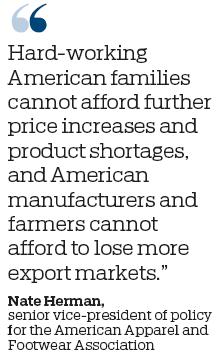US urged to abandon ship levies plan

Fees of up to $1.5 million on Chinese vessels would harm supply chain, hearing told
A coalition of US trade associations, shipping companies and businesses have urged the Office of the United States Trade Representative to not go ahead with a proposed $1.5 million fee on Chinese-made ships that enter any US port.
More than 500 submissions were made to the Section 301 investigation hearings on "China's Targeting of the Maritime, Logistics, and Shipbuilding Sectors for Dominance", held in Washington on Monday and Wednesday.
Thomas R. Byrne, operations manager of East Coast Stevedoring, said in a submission: "The proposed service fee … threatens to have significant negative repercussions for the livelihoods of many Americans.
"By imposing this fee, the cost of maritime trade will increase, placing additional financial strain on US businesses, particularly those reliant on efficient and affordable shipping services."
Organizations attending the hearing included the Chamber of Marine Commerce, the National Retail Federation, the American Apparel and Footwear Association, the China Association of the National Shipbuilding Industry and the American Soybean Association.
Mike Koehne, an Indiana soybean farmer and director of the soybean association, told the hearing that "imposing port fees on most of the maritime fleet that exports from and imports to the US will increase costs for US farmers — both in terms of inputs like fertilizer and seed, and getting crops to the market.
"While well intended, this proposal would ensure US soybeans will bear higher costs and be less competitive in the global marketplace," he said.
A final decision on the fees is expected.
Before the hearings, the plans faced opposition from more than 30 US trade groups that warned in a study that "the various remedies suggested by USTR finds that in every case they would result in net losses for the US economy, US trade and most of the US shipbuilding supply chain".
The American Association of Port Authorities, a trade association that represents multiple public ports, told the hearing that it "urges USTR to reconsider its approach".
"USTR's proposal would raise prices for consumers and businesses, lead to chaos across the nation's port and transportation industries, and would not reduce the international shipping industry's reliance on Chinese shipyards," it said.
The hearing came about after United Steelworkers and four other unions urged the administration of president Joe Biden a year ago to launch an investigation into China's "dominance in shipbuilding".
The gap between the two countries' current shipbuilding capacity led to the proposal of fees to boost and subsidize the US industry.
The fees could include $1 million on any ship owned by a Chinese transport operator or $1,000 of each net ton of a vessel's cargo capacity. There would be a fee of up to $1.5 million on Chinese companies and vessels or maritime transport operators that use Chinese-built ships, based on the percentage of Chinese ships in their fleet.
The fees also could hit operators who plan to order vessels from Chinese shipyards in the next two years. The charges would target any operator that used Chinese ships.
In an earlier response, the Chinese Ministry of Commerce said the investigation is an act of unilateralism and protectionism, violating World Trade Organization rules.
The proposed measures, including the port fees, will drive up global shipping costs, disrupt the stability of the global supply chain and increase inflationary pressures in the US, the ministry said.
This will ultimately undermine the global competitiveness of US goods, harming the interests of both consumers and businesses and jeopardizing the economic growth and job creation that the US aims to protect, the ministry said.
Nate Herman, senior vice-president of policy for the American Apparel and Footwear Association, told the hearing: "Hard-working American families cannot afford further price increases and product shortages, and American manufacturers and farmers cannot afford to lose more export markets."
While the US wants to spur a resurgence, its shipbuilding industry has been in steep decline since the 1970s. Before China became a leading shipbuilder, Japan and South Korea had been steaming ahead.
Agencies contributed to this story.
belindarobinson@chinadailyusa.com






















